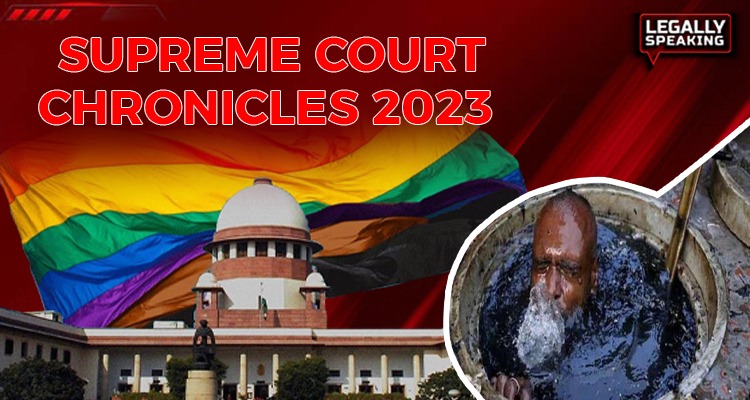
The month of October witnessed pivotal developments in India’s legal landscape, particularly in areas related to LGBTQIA+ rights and the eradication of manual scavenging practices.
The Supreme Court, in a landmark judgment led by CJI Dr. DY Chandrachud, deliberated on Same-Sex Marriage/Marriage Equality, offering nuanced perspectives and advocating for legislative intervention. Additionally, a case before the Supreme Court addressed the urgent need for the vigorous implementation of laws prohibiting manual scavenging, highlighting constitutional commitments to equality and fraternity.
Let’s delve into these significant legal milestones from October:
Same-Sex Marriage
- Supriyo v. Union of India
The 5-judge Constitution Bench of the Supreme Court, led by CJI Dr DY Chandrachud, deliberated on Same Sex Marriage/Marriage Equality, producing four opinions that revealed both agreements and disagreements. Unanimously, the judges asserted there is no fundamental right to marry, emphasizing Parliament’s role in addressing this issue. The Bench rejected judicial legislation to make the Special Marriage Act gender-neutral, advocating for legislative intervention. While all judges recognized transgender and intersex persons’ right to marry under existing laws, a Committee chaired by the Union Cabinet Secretary was formed to define the entitlements of queer couples.
Disagreements arose on the fundamental right to enter into a union. The majority, comprising Bhat, Kohli, and Narasimha, J, emphasized the need for legislative action, rejecting the judicial creation of a regulatory framework for legal recognition of unions. In contrast, CJI Chandrachud and Kaul, J, advocated for a constitutional right to a union, asserting that restricting it based on sexual orientation would violate Article 15 of the Constitution. The Majority also addressed adoption rights, highlighting the discriminatory impact on queer couples. While they refrained from declaring CARA Regulations void, they urged state intervention for equitable treatment of de facto families. The Minority, however, read down the regulations to include unmarried couples, including queer couples, in joint adoptions. The judgment marks a significant step in LGBTQIA+ rights, emphasizing legislative responsibility in shaping marriage and union laws.
- Balram Singh v. Union of India
In a case before the Supreme Court of India, a writ petition sought the vigorous implementation of the Employment of Manual Scavengers and Construction of Dry Latrines (Prohibition) Act, 1993, and the Prohibition of Employment as Manual Scavengers and their Rehabilitation Act, 2013. The division bench, comprised of Justices S. Ravindra Bhat and Aravind Kumar, issued a series of pivotal directives. These included the eradication of manual sewer cleaning, accountability mechanisms for outsourced work, and comprehensive rehabilitation measures for sewage workers and their families. Notably, the Court underscored constitutional commitments to equality and fraternity, emphasizing the prohibition of untouchability, the outlawing of forced labor, and freedom against exploitation. The judgment also addressed the need for a national survey under the 2013 Act, rejecting arguments in favor of solely localized surveys. The Court, in its observations, criticized the insufficient institutional constitution and mechanization for hazardous cleaning, asserting the entitlement of protective gear and cleaning devices for hazardous workers. This landmark case signifies a significant step towards ensuring the dignity and rights of individuals affected by manual scavenging practices.




